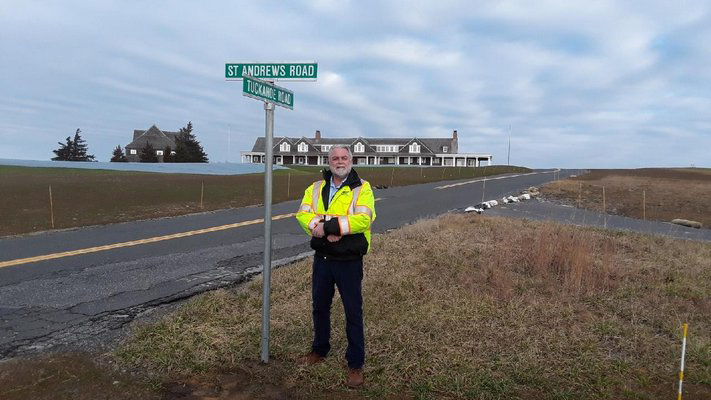
Having called the lawsuit “a complete waste of time and money,” Southampton Town Supervisor Jay Schneiderman recently put forth a resolution for final payment to the consulting attorneys who handled the case of former Highway Superintendent Alex Gregor against the Shinnecock Hills Golf Club.
In an amount not to exceed $56,865, the final payment to the firm Bee Ready Fishbein Hatter & Donovan brings the total tally of attorneys’ fees for Gregor’s case — which both sides agreed to drop — to $104,365.
At issue was the ownership of a section of St. Andrews Road known as “the East Road,” which is located between Tuckahoe Road and the semicircular continuation of St. Andrews Road north of County Road 39.
The dispute traces back to 2016, when Gregor began to refute the club’s ownership of the road. He claimed the East Road was used by the public for almost 100 years, until the 1980s, when the golf club set up barricades at either end of the road, blocking passage.
In 2021 he filed a verified complaint in State Supreme Court seeking a declaratory judgment stating that the public has the right to use East St. Andrews Road. The complaint alleges that the golf club encroached on the public’s property interests and improperly took possession of East St. Andrews Road, designating it “private.”
The club maintains it received the disputed section of the road in a 1930s land swap, and Schneiderman agrees the land was exchanged fair and square.
“No one ever showed me one shred of documentation supporting the former highway superintendent’s claim that the golf course access road belongs to the town,” he said this week. “The former section of St. Andrews Road in question was clearly traded in the 1930s to create County Road 39, which ran through two fairways of the original golf course layout.”
According to Town Attorney James Burke, Gregor was attempting to unravel the 90-year-old agreement between the county, town and the club for the development of what is now known as Country Road 39.
“While I did not agree with the position taken by Alex, I felt from the review of the [state] highway law and case law that he most likely had the right to bring the action as part of his powers as the highway superintendent,” Burke wrote in an email.
The sense was that denying him the right to pursue the complaint could result in litigation about the denial, then more litigation over the original complaint.
Schneiderman, who frequently locked horns with Gregor, underscored: “I was not able to withhold funding, however, because, according to the town attorney, the highway superintendent is allowed to bring such an action.”
After leaving public office, Gregor lost jurisdiction over the road, leaving the decision about continuing the court case up to the new highway superintendent, Charles McArdle. After reviewing the case file and documents, McArdle declined to pursue the case.
“It was in the best interests of the taxpayers of Southampton to end the suit,” he said this week.
Burke wrote that the matter was dropped after a “very intense and thorough conference” with acting State Supreme Court Justice Joseph Farneti, who, according to Burke, was clearly in favor of the club’s motion to dismiss.
Burke admitted he had questions himself regarding what the resolutions from 1932 meant, but he wrote that after meeting with Suffolk County a number of times and reviewing maps, “it became very clear that the entire St. Andrews Road, both east and west of Tuckahoe Road,” were included in the land swap agreement. Suffolk County Department of Public Works officials came up with a map that he said is “really very clear.” He noted that the club actually gave away more square footage than it got.
At a court conference about the club’s petition to dismiss in Riverhead last month, it was clear which way the justice was going to rule, and when town officials told him they would drop the action, Burke recalled, “He said that was the right thing to do.”
Gregor declined a request to speak to the specifics of the case and its dismissal.